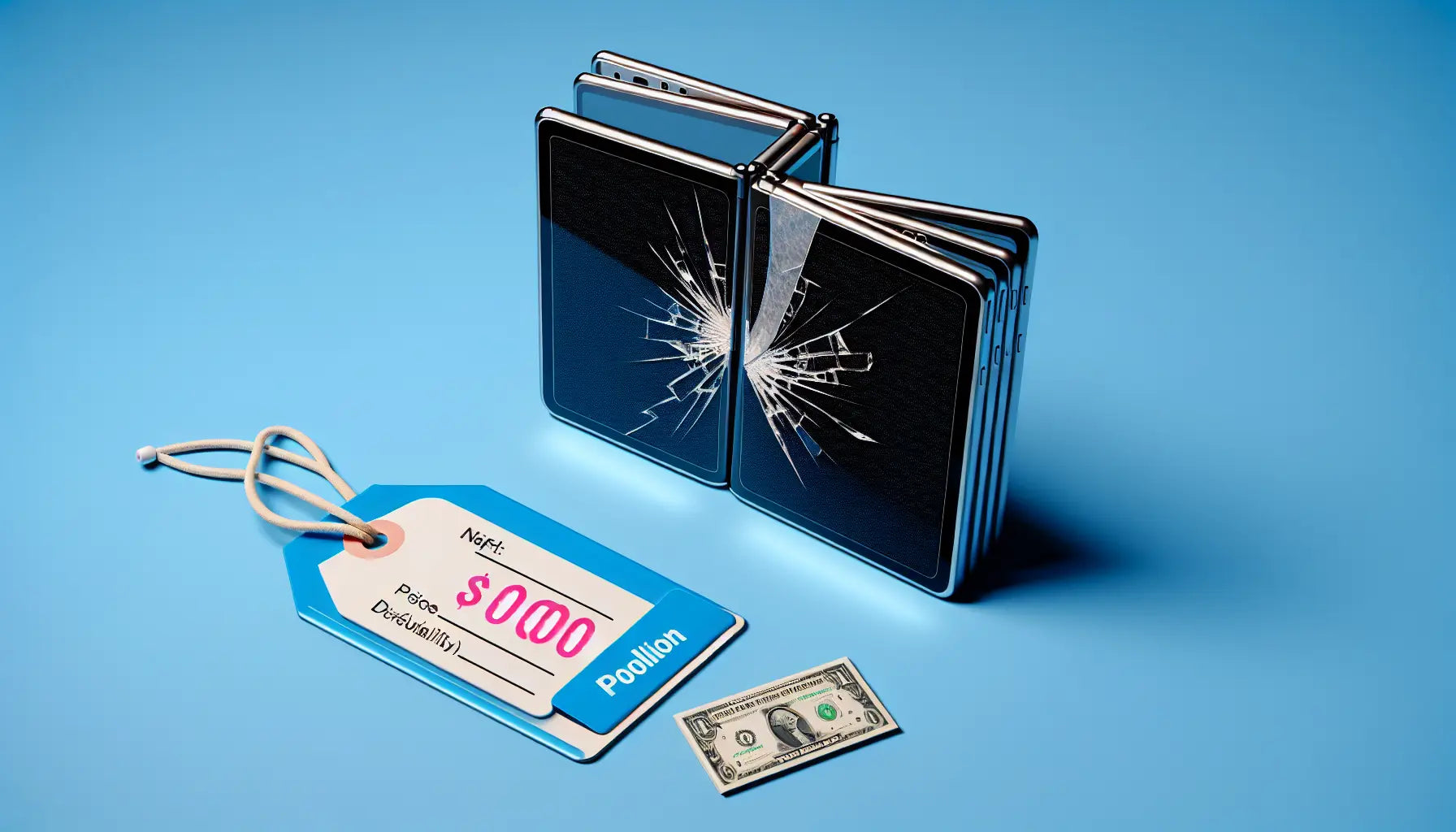What's Stopping Folding Shoppers from Buying? Price or Durability?

Introduction
He further explicates that price will altogether play a part, and at times even become a determiner for buyers' decisions with the issue of durability, when buying a folding smartphone. In this newsletter, we are going to delve deeper into the effect of both pricing and durability on the folding smartphone market and how these features influence consumer behavior.
Rumors and Pricing
Recent rumors have suggested that a cheaper variant of the upcoming Galaxy Z Fold 6 may be in the works.
Specific pricing details largely remain speculative, but one rumor did indeed suggest that a sub-Dhs. 3,672.30 version of the Z Fold 6 would make the cut just without certain premium features.That asks the question: Will it be possible for Samsung to cut costs and be competitive enough to gain the sale of its folding smartphone to potential buyers?
Looking at data from an informal poll conducted by the author, it's clear that price plays a big part in that. The poll, however, placed price as the biggest factor stopping the majority from buying a foldable device. From the very same poll, though, the concern about the device's durability came out as the second-closest factor just after the price, with quite a percentage of those surveyed marking it as a factor in keeping them away from buying a folding phone.
While a more competitive price might certainly woo in some potential buyers, it must be understood that this price point versus the competition also plays at least an equal role in the consumer's minds in regard to concerns over durability. And even if the price does come down considerably, very few among them would go ahead with the purchase of a folding smartphone because of long-term durability concerns on such a device. This, therefore, brings out the need for addressing both pricing and durability concerns, if they are to target the folding smartphone market.
Primary Reasons for Not Owning a Folding Phone
Even consumers of the folding smartphone have hesitated to take it. There are several reasons due to which a consumer hesitated in owning a folding smartphone. There are some main reasons due to which consumers couldn't own a folding phone:
Price:
The cost attached to it is also a huge set-off for many potential buyers. Most of the time, consumers are not willing to invest in the phone since most of the time it is more than Dhs 3,672.30, as they could acquire a similar traditional smartphone at a cheaper cost.
Durability:
The other major concern by the consumers is also on the long-term durability associated with folding phones. Despite the advances that have always come in the area of folding screen technology, many consumers have never stopped viewing the folding phones as very delicate and easy to spoil, hence asking how long they would last.
Value for your money:
What customers would need to be sure of in a folding phone is that they can get something substantial with their money. They would be keen to ensure that the device stands up and withers the test of time while commanding somewhat higher prices.
Uncertain about future advancements:
The fact is that some consumers may be holding off buying a folding phone because they are uncertain if folding technology will further advance. They expect enormous improvements that could resolve problems in advance. In general, these are the common key reasons as to why one would not purchase a folding phone: the cost, fragility, question of value, and hope that folding technology might develop further.
Community Survey on Price Discrepancy
When asked what factor would most likely stand in the way of considering a purchase for a folding phone, most respondents identified the price as their purchasing constraint. The survey results indicated that even a far smaller difference in price was likely not influencing consumer buying.
Where there was a price difference and needed to switch their device to a foldable phone, the large proportion of them at 56.4% remained loyal to their gadget of choice and not to the one that involves a price difference. Moreover, the survey revealed that concerns about durability also play a substantial role in consumer decision-making.
Most of them indicated durability as a major impediment to the purchase of the folding phone. This indicates to manufacturers to look into pricing as well as durability concerns if they are to effectively target this market for folding smartphones.
These underline, through the community survey, the need to address concerns regarding price and durability to be able to attract potential buyers and hence increase the attractiveness level of the folding smartphone in the market.
Results of the Survey
Asked about getting a foldable phone, most of them pointed out the price as the biggest hindrance in the way of acquiring the foldable device.
A recent survey has shown that, "even a small price difference might not move the needle in terms of influencing what consumers will buy. It was asked to the context of the willingness of the customers to shift towards another folding phone due to price variance, where many of the respondents were confident about their preferences for a phone, irrespective of price change.
Moreover, the survey revealed that concerns about durability also play a substantial role in consumer decision-making.
Many participants say that pricing and durability are a big discouraging factor for people to buy a folding phone. It is something that signals to the maker that they need to pay equal attention to both pricing and durability if they want to make a successful approach to the folding smartphone market.
More to the point, further insights from the community-based survey point out the need for pricing and concerns regarding durability that have to be addressed in efforts to make folding smartphones more appealing in the market.
The Two Main Factors: Price vs. Durability
Price and durability are the two main issues influencing consumer choice regarding the purchase of a folding smartphone. Even though the most valid factor, from a majority of potential buyers, is the price, an increase in the concerns about durability may also be assumed to yield an effect on consumer behavior.
Price:
So high have been the prices that consumers have shied away from buying a foldable smartphone, usually priced above Dhs 3,672.30.
And here lies the power of price in purchase decisions: the potential buyer does not even leave his dreamed-about gadget because of a very small difference in the price. It adds up to taking into account and making their pricing more attractive in order to draw buyers in this market.
Durability:
If anything, the long-term reliability of these folding smartphones will add an already hesitant consumer base. Even with the advancement of the folding screen, there was the perception of fragility around it. Manufacturers will also have to put these concerns to rest so that potential buyers don't have any doubts, and the appeal of the folding smartphone as a viable device increases.
This, therefore, makes it very imperative, putting it forward, that the manufacturers must get a balance between cost and durability to resonate well with the consumers and penetrate the market effectively.
The Impact of OnePlus on the Market
Without any doubt, the entry of an even cheaper alternative into the market by OnePlus is set to elicit hot competition in the folding smartphone market. The OnePlus foldable smartphone, on the other hand, is said to be cheaper and thus easily cut out by many other competitors in the market.
Their recent years have shaken the market by poking other manufacturers to look at their pricing strategies, as demand increases for more budget-friendly folding devices. OnePlus has, therefore, opened up the market to many buyers who have been jaded by the cost of other folding smartphones, which was a turn-off to buyers.
This price dynamics, in turn, forced other manufacturers in a rethink, emphasizing the necessity of addressing consumer complaints with regard to affordability, on the one hand, and the need to keep the prices attractive without losing quality of the product, on the other.
Concerns About Durability and Perception
Even as the price of folding smartphones keeps falling, concerns over durability and perception remain huge barriers to a potential buyer. Even though the cost has always been on most consumers' minds, perception and actual fragility weigh heavy as some of the deciding factors in making the purchase.
Perception vs. Reality:
General perception is that foldable phones, due to their nature, are delicate gadgets, and therefore, the general perception regarding the durability of these gadgets is negative. This general impression often takes a hit on anecdotal accounts of device breakages and sensationalism of these incidents from any form of media or online forum. The prospective buyers, in turn, are denied to step in into the market of foldable smartphones for the sake of toughness and durability concerns regarding the folding smartphones.
Addressing Durability Concerns:
Manufacturers of foldable smartphones have a Herculean task to deal with any durability concerns that come associated with such devices and assure potential buyers.
An improvement in the technology of folding screens and mechanisms of hinges generally improved the robustness of this kind of devices. However, the communication with consumers must be improved in this regard. This requires very clear messaging on their part to dispel such misconceptions and lay down a perception of the reliability of folding smartphones in front of potential buyers.
Overcoming Negative Perceptions:
It would take actual, focused efforts to turn that narrative around folding phones—from how flimsy they are to how durable and strong they can really be.
This could help reshape—through live use-cases, strenuous testing processes, and customer testimonials—what was a very fragile perception and chances of damage which folding devices once held. This proactive approach would put to rest consumer hesjsonce it and prove that folding smartphones are indeed the reliable, long-term investment they were meant to be.
Perception vs. Reality: The Case for Durability
One common point of view in buying hesitation is against the market of folding smartphones: the durability issue. Though this view may not be enough to measure the reality about the durability of modern folding smartphones.
While concerns of durability did figure as a marked deterrent for many in the community survey, it is important to look further at what else underlies some of these perceptions of durability. Many of the negative anecdotes around breakages of devices and even sensationalized incidents in media and online forums have together worked to create this perception of fragility around folding smartphones.
Folding smartphone manufacturers are challenged by the dilemma of addressing questions of durability in the minds of potential buyers. Developments in folding screen technology and hinge mechanisms have greatly improved the overall robustness of these devices. The clear message of being tested for durability, material quality, and everyday use can play a contributing role, if not for anything else, in busting the myths but also in adding up to the small level of trust that can be made in relation to the reliability of folding smartphones.
This, in the end, requires making an active effort to change the story around folding phones, focusing on their real strength and toughness. This calls for use cases from the real world, testing, and testimonials from customers on how the devices have not proved to be of fragile nature and easy to break.
Moving Forward: Samsung's Strategy
Samsung has to make a balanced approach in reaching out to the potentials of the target group of folding smartphone buyers, covering price and durability effectively. That rumors are turning with the development of an affordable edition of the upcoming Galaxy Z Fold 6; Samsung is likely moving much closer towards bridging the price gap, which is a concern for these prospective buyers. However, Samsung has to understand that the question of solidity also cuts out a bigger part in the customers' purchase decision.
The company has to make clear its argument on the devices' durability and toughness through lucid messages, real performance, and openness on testing and quality standards. He added that highlighting durability next to offering a more competitive pricing would help folding smartphones improve their appeal in the market and attract a wider segment of potential buyers. This would make the approach balanced if applied properly and be able to keep Samsung going in the changing competition, addressing two major issues of cost and durability that play a vital role in affecting consumer behavior.
FAQs
1. What are the primary reasons for not owning a folding phone?
A community survey had 52% saying they would not buy a folding phone, with pricing and durability being some of the biggest concerns. On the other hand, their high price easily discourages many potential buyers, with costs often retailing north of Dhs 3,672.30. Further, a lot of people have felt that folding phones are very delicate and might just break; they worried about how long they would last.
2. How do the consumers think of the balance between quality and price?
Although the price is the basic worry for most of the buyers, the durability is the other aspect that can also be influential in the consumer decisions. Since even competitors offer a lower price, some customers may be worried that the folding phone might not be as durable in the long run. This denotes the need for the producers to develop strategies for both pricing and sturdiness if they want to compete effectively in the folding smartphone market.
3. How does psychological perception effect utility of folding smartphones?
The immaculate conception of vulnerability around foldable smartphones represents a considerable hindrance for prospective customers. Negative accounts of device breakages and these superficial media stories run online forums cause a commonplace idea of folding phones are belief of being fragile. Though the achievements in screen folding technologies and hinge mechanisms add to the overall device’s ruggedness, manufacturers are thwarted to address the durability issues more to influence consumer confidence.
4. Does Samsung have a solution to the price and durability issues dear to the heart of potential consumers?
Samsung's strategy towards folding smartphones potential consumers entails a careful balance between affordability and durability ongoing issues. In order to achieve a competitive edge, while also ensuring that the durability and reliability of its foldable devices is highlighted through clear messaging, live demonstrations and transparency regarding the testing protocol and quality standards, Samsung aims to make the use of folding phones more appealing and attract a broader range of buyers. Therefore, this balanced approach gives Samsung the lead in the trending segment of foldable phones by addressing the top deciding factors of value and ruggedness that influence the consumers.




